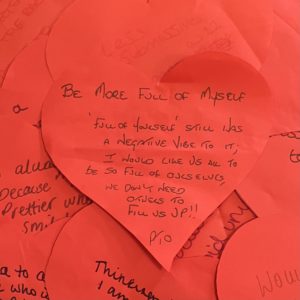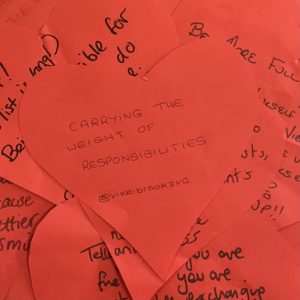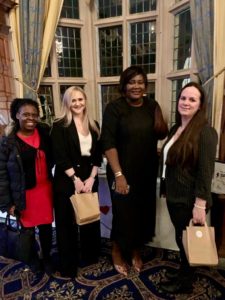
By Pamilerin Beckley, Architect of Stories
‘I would like to be more full of myself. “Full of yourself” still has a negative vibe to it; I would like us all to be so full of ourselves, we don’t need others to fill us up!!.’ – @dawnowencoach
At a recent Galentine’s networking event hosted by The Haven, I had the opportunity to deliver my talk titled “Anything But A Lady.” The aim was to inspire women to challenge traditional notions of femininity and embrace their authentic selves. This message aligns with this year’s theme for International Women’s Day, “Inspire Inclusion,” which encourages us to celebrate the diversity and uniqueness of all women.
To truly “inspire inclusion”, we must also address the systemic biases and barriers that prevent women from reaching their full potential. This includes challenging societal pressures on women to conform to certain ideals of femininity, from subtle microaggressions like norms around appearance, such as wearing makeup, high heels, or certain types of clothing in professional settings. This expectation can create a double standard, as men are not typically held to the same standards of appearance. It can also create a financial and time burden for women, as well as contribute to a culture that objectifies and judges women based on how they look, rather than their skills and abilities.
 While dress codes and professional attire guidelines are common in many workplaces, it is important to ensure that they are not disproportionately affecting women or creating a culture of discrimination or objectification.
While dress codes and professional attire guidelines are common in many workplaces, it is important to ensure that they are not disproportionately affecting women or creating a culture of discrimination or objectification.
‘I would like to let go of the pressure to dress “appropriately” to suit different audiences.’ – Anonymous attendee
There are also the bigger issues that have an economic impact on women like the underrepresentation of women in leadership positions. This can stem from the assumption that women are less decisive, assertive, and authoritative than men. This stereotype, known as the “think manager, think male” bias, leads to a perception that women are less suited for leadership roles and are better suited for supportive or nurturing roles. This bias can manifest in hiring and promotion decisions, performance evaluations, and mentorship opportunities, creating the “glass ceiling” that prevents women from advancing to the highest levels of leadership.
 A lot of people think that the gender pay gap is just about equal pay for equal work. But it is also about these systemic barriers that prevent women from accessing the highest-paying jobs and leadership positions. Even when women have the same qualifications and experience as their male counterparts, they may face barriers such as unconscious bias, lack of mentorship and sponsorship, and limited opportunities for advancement. This can limit their earning potential and perpetuate gender inequality in the workforce.
A lot of people think that the gender pay gap is just about equal pay for equal work. But it is also about these systemic barriers that prevent women from accessing the highest-paying jobs and leadership positions. Even when women have the same qualifications and experience as their male counterparts, they may face barriers such as unconscious bias, lack of mentorship and sponsorship, and limited opportunities for advancement. This can limit their earning potential and perpetuate gender inequality in the workforce.
By highlighting these issues, we can raise awareness and inspire action towards creating a more inclusive and supportive culture for women, where they can thrive and succeed on their own terms.
‘I would like to let go of dressing ‘appropriately’ at social events to avoid unwanted attention.’ – Anonymous attendee
 The impact of traditional notions of femininity extends beyond the workplace, shaping women’s experiences in all aspects of their lives. After the talk I asked those present to think of societal norms that they would like to let go off to be their most authentic selves. One of the issues that was raised is what is often called the “double bind”. The “double bind” refers to the conflicting expectations placed on working mothers, who are often expected to fulfil the roles of both the ideal worker and the ideal mother. This can create a no-win situation, where women are criticised for being too career-focused and neglecting their families, or for being too focused on their families and not committed enough to their careers. The pressure to conform to these conflicting expectations can lead to increased stress and burnout, as working mothers may feel like they are constantly falling short in one area or another.
The impact of traditional notions of femininity extends beyond the workplace, shaping women’s experiences in all aspects of their lives. After the talk I asked those present to think of societal norms that they would like to let go off to be their most authentic selves. One of the issues that was raised is what is often called the “double bind”. The “double bind” refers to the conflicting expectations placed on working mothers, who are often expected to fulfil the roles of both the ideal worker and the ideal mother. This can create a no-win situation, where women are criticised for being too career-focused and neglecting their families, or for being too focused on their families and not committed enough to their careers. The pressure to conform to these conflicting expectations can lead to increased stress and burnout, as working mothers may feel like they are constantly falling short in one area or another.
‘I would like to let go of “mum stuff”! The list is long. Being responsible for everything to do with childcare … I love being a mum and I don’t begrudge it but the societal pressure to do everything and to do it all perfectly is overwhelming.’ – Anonymous attendee
 The societal pressure on women to be “perfect” in both their roles as mothers and workers can have a significant impact on their mental health and wellbeing. The expectation to juggle multiple responsibilities without showing signs of stress or struggle can lead to feelings of guilt, inadequacy, and burnout. This pressure can be particularly intense for mothers from marginalised communities, who may face additional challenges such as lack of access to resources and discrimination in the workplace.
The societal pressure on women to be “perfect” in both their roles as mothers and workers can have a significant impact on their mental health and wellbeing. The expectation to juggle multiple responsibilities without showing signs of stress or struggle can lead to feelings of guilt, inadequacy, and burnout. This pressure can be particularly intense for mothers from marginalised communities, who may face additional challenges such as lack of access to resources and discrimination in the workplace.
To promote the wellbeing of working mothers, we must challenge these unrealistic expectations and provide more supportive policies and practices that recognise the unique challenges they face and provide them with the resources they need to thrive in both their careers and their family lives. To create a society that is more inclusive, we must recognise the challenges that working mothers face and provide more flexible policies, such as affordable childcare, paid family leave, and flexible work arrangements, just to name a few.
‘I would like to let go of the pressure to always smile because “you look prettier when you smile”.’ – Anonymous attendee
‘I would like to let go of being a “nice” person conforming to make others like me.’ – @wisdomforworkingmums
 Another woman mentioned the societal expectations placed on women to smile; always appearing happy and how this can be incredibly damaging to their mental health and self-esteem. The pressure to conform to this ideal can lead to a constant state of self-monitoring and self-criticism, as women may feel like they are never good enough. This can result in negative body image, disordered eating, and other mental health issues.
Another woman mentioned the societal expectations placed on women to smile; always appearing happy and how this can be incredibly damaging to their mental health and self-esteem. The pressure to conform to this ideal can lead to a constant state of self-monitoring and self-criticism, as women may feel like they are never good enough. This can result in negative body image, disordered eating, and other mental health issues.
The pressure to appear happy and attractive can be particularly intense for women in certain professions or industries, such as entertainment or fashion, where appearance is often seen as a key factor in success. This can create a toxic culture of comparison and competition, as women may feel like they need to constantly outperform each other to be valued and accepted.
To challenge these norms, we must recognise the value and contributions of women beyond their appearance and promote more inclusive and equitable practices in these industries. This includes providing more opportunities for women of all shapes, sizes, and backgrounds, and recognising that true success comes from authenticity and individuality, rather than adherence to societal expectations.
To promote a more inclusive and body-positive culture, we must challenge these unrealistic expectations and recognise that women’s worth is not defined by their appearance or their ability to conform to societal norms. This includes promoting diverse representations of women in the media, encouraging self-acceptance and self-love, and providing resources and support for those struggling with body image and mental health issues.
‘I would like to let go of telling people I am fine when I am not when exchanging small talk or pleasantries.’ – Anonymous attendee
‘I would like to let go of giving up my space to men – cinema armrests, benches, pavements – feeling like I need to move and be less.’ – Anonymous attendee
 Perhaps the most poignant comment came from a woman who said she always feels the need to shrink and silence herself and to give up her space when there are men around. This woman’s comment reflects a deep-seated societal expectation that women should be submissive and deferential to men, particularly in professional or public spaces. This expectation is rooted in traditional gender roles and power dynamics that position men as dominant and women as subordinate. As a result, women may feel pressure to make themselves smaller, speak less, or yield to men’s opinions to avoid backlash or be perceived as “difficult” or “aggressive.” This silencing of women’s voices and perspectives perpetuates gender inequality and denies women the opportunity to contribute fully to decision-making processes.
Perhaps the most poignant comment came from a woman who said she always feels the need to shrink and silence herself and to give up her space when there are men around. This woman’s comment reflects a deep-seated societal expectation that women should be submissive and deferential to men, particularly in professional or public spaces. This expectation is rooted in traditional gender roles and power dynamics that position men as dominant and women as subordinate. As a result, women may feel pressure to make themselves smaller, speak less, or yield to men’s opinions to avoid backlash or be perceived as “difficult” or “aggressive.” This silencing of women’s voices and perspectives perpetuates gender inequality and denies women the opportunity to contribute fully to decision-making processes.
Women in male-dominated fields and industries are constantly dealing with these challenges, which can lead to self-censorship and a reluctance to share ideas or take on leadership roles. It is crucial to challenge these societal expectations and create a culture where women are empowered to speak up and take up space without fear of judgment or repercussions. Only then can we achieve true gender equality and create a society where everyone’s voice is valued and respected.
‘I would like to let go of being too submissive.’ – Anonymous attendee
I would like to let go of my indecisiveness which is caused by feeling the need to obtain confirmation and validation of my opinions.’ – Anonymous attendee ‘I would like to let go of carrying the weight of responsibilities.’ – @vikkibrooksva
 From the pressure to conform to unrealistic expectations, to the challenges of navigating male-dominated industries, it’s clear that there is still much work to be done to create a more inclusive and equitable society for women. We must create a culture that values and respects women’s voices and perspectives, and that actively encourages women to speak up and take up space in professional and public settings. As we continue to reflect on inspiring inclusion, let us consider how we can promote gender equality and challenge traditional notions of femininity in our own lives and communities.
From the pressure to conform to unrealistic expectations, to the challenges of navigating male-dominated industries, it’s clear that there is still much work to be done to create a more inclusive and equitable society for women. We must create a culture that values and respects women’s voices and perspectives, and that actively encourages women to speak up and take up space in professional and public settings. As we continue to reflect on inspiring inclusion, let us consider how we can promote gender equality and challenge traditional notions of femininity in our own lives and communities.
Whether it’s through advocating for more inclusive policies in the workplace, supporting women-owned businesses, or simply having conversations with friends and family about these issues, we all have a role to play in creating a more just and equitable world. Let us commit to being agents of change and working towards a future where women are truly included, valued, and empowered to reach their full potential as their authentic selves.
Pamilerin Beckley is the Architect of Stories; driving survivor-focussed creative communications and public relations at The Haven Wolverhampton, while challenging societal norms via her blog thepenwarrior.com.
If you are passionate about gender equality, eliminating violence and advancing women’s rights and are interested in writing an Op-Ed for The Haven, you can submit your articles via media@havenrefuge.org.uk and a member of our communications team will be in touch.



